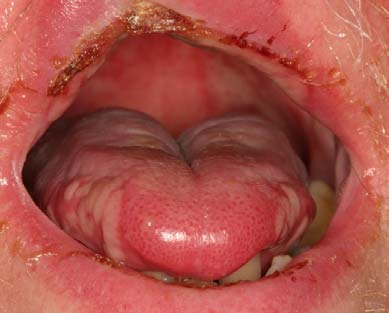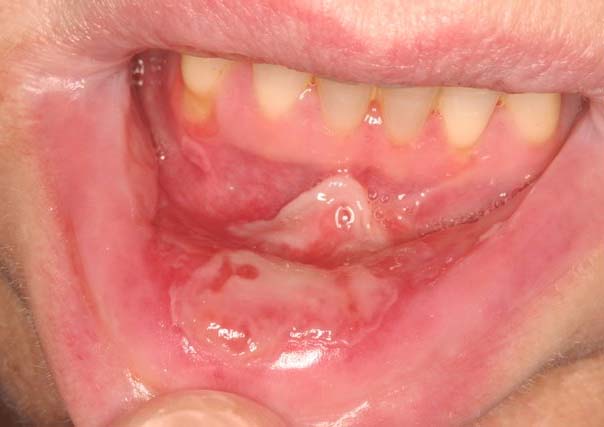Oral Mucositis
Treatment for cancer typically involves a combination of chemotherapy, radiation, and/or surgery. One of the unfortunate consequences of these therapies is the development of painful mouth sores, known as oral mucositis.
With recent advances in the prevention and management of other cancer treatment-related complications, such as nausea and neutropenia (low white blood cells), oral mucositis has emerged as one of the most debilitating and dose-limiting side effects of cancer therapy.
Causes of Oral Mucositis
High dose chemotherapy, and localized high dose radiation therapy to the head and neck region (e.g. for treatment of head and neck cancer and lymphoma), are the main risk factors for developing oral mucositis. These treatments effectively target the rapidly dividing cancer cells, but also inadvertently affect normal healthy cells that rapidly turnover, such as the oral mucosa lining of the inside of the mouth. A complicated series of biological events are triggered that ultimately compromise the integrity of the oral mucosa. Minor trauma to the mouth from speaking, chewing, and swallowing, is sufficient to breakdown the mucosa, resulting in the formation of painful ulcerations. Individuals undergoing chemotherapy or radiation therapy are often advised to eat a soft or liquid diet. Mucositis is not an infectious process and therefore cannot be prevented with antibiotics or antiviral medications and cannot be passed to another person.
Impact of Oral Mucositis
  Symptoms of discomfort and pain often precede the visible tissue changes in the mouth and throat. In the earliest stages, there may be distinct areas of redness (erythema). The red areas soon progress to form painful ulcerations, which usually appear as round or linear yellow/white plaques. The insides of the cheeks and lips and the sides and underside of the tongue are the most commonly affected sites (see images to Left and Right). Small ulcerations may only be mildly discomforting, while larger and more extensive ulcerations may cause pain so severe as to interfere or prevent with eating and drinking. When such severe cases occur, the use of feeding tubes may be required to ensure the patient obtains adequate nutrition and hydration. Symptoms of discomfort and pain often precede the visible tissue changes in the mouth and throat. In the earliest stages, there may be distinct areas of redness (erythema). The red areas soon progress to form painful ulcerations, which usually appear as round or linear yellow/white plaques. The insides of the cheeks and lips and the sides and underside of the tongue are the most commonly affected sites (see images to Left and Right). Small ulcerations may only be mildly discomforting, while larger and more extensive ulcerations may cause pain so severe as to interfere or prevent with eating and drinking. When such severe cases occur, the use of feeding tubes may be required to ensure the patient obtains adequate nutrition and hydration.
QUESTIONS AND ANSWERS ABOUT ORAL MUCOSITIS
Q: Does mucositis always develop when receiving chemotherapy and or radiation?
A: The risk of developing mucositis is variable and dependent upon numerous factors such as the form of treatment, the agents used, the intensity of therapy, and the patient’s overall health. Mucositis associated with a full course of radiation treatment to treat cancer of the head and neck is fairly predictable. Your oncologist will advise you on your risk of developing mucositis.
Q: When should I expect to develop oral mucositis and how long does it last?
A: You should always discuss this question with your oncologist. If you are receiving chemotherapy, mucositis usually develops approximately 7-10 days after drug administration and lasts for a week or two. Healing typically correlates with restoration of your blood counts and occurs fairly rapidly. If you are receiving radiation therapy for cancer in the head and neck region, mucositis typically develops after the first 2-3 weeks of radiation therapy, and persists throughout the remainder of therapy. Following the completion of radiation therapy, it may take an additional two to four weeks for the mouth to heal.
Q: How do I know if I have oral mucositis?
A: You should alert your oncologist or nurse as soon as you develop any type of discomfort in your mouth. In addition to examining your mouth, your oncologist may perform additional testing to be sure you are not developing an infection. The most common infection encountered in this setting is a fungal infection (see PATIENT INFORMATION SHEET - Oral Yeast Infections).
Q: Can oral mucositis be prevented?
A: Unfortunately, there is very little that can be done to prevent mucositis from occurring. However, there are several things that you can do to minimize your risk. When possible, teeth with sharp edges or defective dental restorations should be treated by your dentist prior to undergoing cancer therapy. Having a healthy mouth improves your odds of avoiding complications. During cancer therapy, it is important that you to maintain good oral hygiene. Finally, you should ask your oncologist if there are any new drugs or protocols that you may be eligible for to reduce your risk of oral mucositis. Some patients undergoing hematopoietic stem cell transplantation may be eligible to receive a medication called palifermin which is approved by the US Food and Drug Administration (FDA) for the prevention of oral mucositis.
Q: What should I expect once I have been diagnosed with oral mucositis?
A: The severity of oral mucositis varies from patient to patient and can last for a few days to in severe cases several weeks. Thus, you should discuss any concerns or questions you have with your oncology team. Your oncologist may prescribe a prescription-strength pain medication to control your discomfort and allow you to eat and drink. You may also be given a topical rinse, such as viscous lidocaine or some other mouthwash formulation to help sooth your mouth and reduce your pain. Your doctor may advise you to limit your diet to softer foods and liquids for comfort sake and to add nutritional supplements (e.g. Boost®, Ensure®) to ensure the nutritional adequacy of your diet. If at any time you are unable to eat, you must speak with your nurse or oncologist to make sure that you are receiving adequate nutrition and hydration.
Recommended Links:
Prepared by N. Treister and the AAOM Web Writing Group
Updated 22 January 2015
Spanish Translation - Traducción Español
The information contained in this monograph is for educational purposes only. This information is not a substitute for professional medical advice, diagnosis, or treatment. If you have or suspect you may have a health concern, consult your professional health care provider. Reliance on any information provided in this monograph is solely at your own risk. |


 Symptoms of discomfort and pain often precede the visible tissue changes in the mouth and throat. In the earliest stages, there may be distinct areas of redness (erythema). The red areas soon progress to form painful ulcerations, which usually appear as round or linear yellow/white plaques. The insides of the cheeks and lips and the sides and underside of the tongue are the most commonly affected sites (see images to Left and Right). Small ulcerations may only be mildly discomforting, while larger and more extensive ulcerations may cause pain so severe as to interfere or prevent with eating and drinking. When such severe cases occur, the use of feeding tubes may be required to ensure the patient obtains adequate nutrition and hydration.
Symptoms of discomfort and pain often precede the visible tissue changes in the mouth and throat. In the earliest stages, there may be distinct areas of redness (erythema). The red areas soon progress to form painful ulcerations, which usually appear as round or linear yellow/white plaques. The insides of the cheeks and lips and the sides and underside of the tongue are the most commonly affected sites (see images to Left and Right). Small ulcerations may only be mildly discomforting, while larger and more extensive ulcerations may cause pain so severe as to interfere or prevent with eating and drinking. When such severe cases occur, the use of feeding tubes may be required to ensure the patient obtains adequate nutrition and hydration.